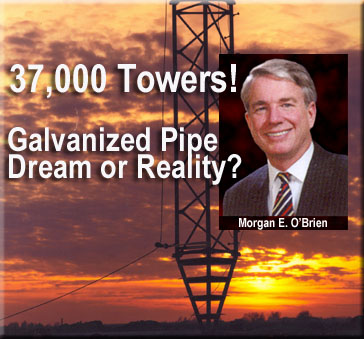|
Daring 700 MHz spectrum plan could result in largest tower and construction windfall ever seen
April 28, 2006 -- If Morgan O'Brien's mission of persuading Congress to set aside a slice of radio spectrum worth billions of dollars and use private money to build  a nationwide wireless network for first responders ever becomes a reality, it would create a wireless construction boom without equal. a nationwide wireless network for first responders ever becomes a reality, it would create a wireless construction boom without equal.
The wireless maverick that helped found Nextel Communications, Inc. suggested during a news conference yesterday in Washington that the government should choose one company - ideally his new venture, Cyren Call Communications LLC - to solicit as much as $20-$25 billion in investment capital needed to build about 37,000 wireless towers to cover the country.
Plan has its share of opponents
However, it's doubtful that tower manufacturing CFOs and construction company CEOs will see net incomes fly off the chart anytime soon if CTIA The Wireless Association, carriers and Congressmen have their way.
Steve Largent, president of CTIA, is adamant that "a new debate would arrest the progress Congress has made" in providing spectrum for public safety and might actually delay the development of new networks.
Congress has agreed to auction the 30 megahertz of radio spectrum that O'Brien wants set aside, hoping to net roughly $5 billion for the government. Many analysts believe there is no outside chance in getting lawmakers to give up that money.
O'Brien proposed a plan to the FCC that would reallocate 30 MHz of spectrum in the 700 MHz band vacated by broadcasters for a national, interoperable emergency network. The proposal would use 747-762/772-792 MHz bands to construct the shared system.
Cyren Call has asked the FCC to study their idea and to solicit comments from interested parties. O'Brien would also need approval from Congress, and he has begun consulting with people on Capitol Hill.
O'Brien said the network could provide new wireless services for police, fire and medical personnel who now use a hodgepodge of thousands of independent and typically incompatible radio systems.
"The DTV bill which Congress recently passed will clear 24 MHz of spectrum for critically important public safety interoperable communications, provide $1 billion for new public safety radios, enable the auctioning of valuable spectrum for new wireless services for consumers all across America and bring in billions of dollars to the federal treasury from those auctions. The Cyren Call proposal threatens to undermine that equation, and for this reason I oppose it," said Rep. Fred Upton, R-Mich., chairman of the House Subcommittee on Telecommunications and the Internet in a statement released yesterday.
Spare capacity capabilities could offset system costs
The network's spare capacity, such as streaming video and broadband Internet access, would be "humongous," O'Brien told the media, and would be marketed for profit by companies that might offer wireless broadband service for consumers or secure financial transactions for banks.
Although O'Brien's plan has its detractors, some key public safety officials believe that his proposal could be encouraging. Analysts who saw how O'Brien was able to change the FCC's entrenched positions when he helped to found Nextel, are not dismissing Cyren Call's capability to do the same with the proposed network.
O'Brien provided the keynote address at last September's CTIA's convention in Hollywood, FL, where he said the condition of public safety first responders' communications in the United States was a "total disgrace by any standard".
"I don't have the recipe for success. What I do have," O'Brien said, "are some of the ingredients for success."
"My first ingredient," O'Brien said, "is 700 MHz is the rational basis, the only sensible place this system must be built."
The multi-millionaire was asked during yesterday's news conference whether the proposal was less altruistic and primarily a profit play for Cyren Call. He quickly responded with, "No. You know what I am doing this for? This is in lieu of actually going into public service, which I don't have the guts for," he said. "This is quasi-public service."
|